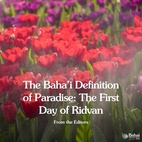The views expressed in our content reflect individual perspectives and do not represent the official views of the Baha'i Faith.
According to the prophet Muhammad, whose ministry began in 622 AD, the Trinitarian doctrine, along with the image of God on which it is based, is completely flawed and even blasphemous.
In addition, if the first premise established at the Nicaean Council in 325 AD was erroneous, and Christ was not of the same essence or station as God, then every doctrine based on or derived from that syllogism was likely to be equally flawed.
This is not to say that Muhammad was in any sense disdainful of Christ or Christianity.
RELATED: Did Jesus Foretell Muhammad?
Muhammad acknowledged that Christ was a manifestation or messenger of God, that he was the messiah, that he was indeed born of a virgin, and that Mary was the foremost woman of the Christian dispensation. But at the forefront of Muhammad’s image of God are his statements in the Qur’an emphasizing the singleness and uniqueness of God. From the point of view of Islamic belief, the Creator is exalted far beyond the limitations of language or human conception. Furthermore, Muhammad asserted that God is an indivisible spiritual essence that cannot be portioned out to any other being, not even to a prophet or manifestation of God.
In this sense, the Qur’an offers three abiding themes especially relevant to our study:
1. the assertion that there is only one God, and those who add gods to God are committing the grossest sort of blasphemy;
2. that God has always had in place an established, enduring, and systematic plan by which He has nurtured and guided humankind through a sequence of messengers who bring new revelations or new chapters in the ongoing Book of God; and
3. that Muhammad, whose chapter in that “Book” is the Qur’an itself, is the most recent of these messengers.
Most other doctrinal discussions in the Qur’an are subordinated to one of these three central themes.
Muhammad expanded and clarified the image of God significantly by talking at length about the various “names” of God, those attributes that allude to the inherent nature or qualities of God. For example, the Qur’an describes God as just, loving, forgiving, beneficent, and benevolent. A second category of the names of God alluded to in the Qur’an are the references to the powers of God. For example, He is also described as ever-forgiving, omnipotent, omniscient, and omnipresent.
Inseparable from this theme of the names or attributes and powers of God are Muhammad’s often repeated allusions to the educational system by which God has covenanted to be always in the “presence” of humankind. The means by which God accomplishes this is to send messengers who function at His behest and who perfectly exemplify or manifest His attributes, in spite of being persistently rejected, disdained, and persecuted by the very people whom they are sent to educate and assist.
These two themes are inseparable and reciprocal aspects of a single thesis. God as an essentially metaphysical Being does not need to intervene personally in human events — His metaphysical hands do not literally reach down to direct human affairs, as implied in the Old Testament or as portrayed in Michelangelo’s masterpiece on the ceiling of the Sistine Chapel. That telling gap depicted in the painting between the fingers of God and Adam becomes bridged by those messengers whom God empowers to carry out His bidding.
Muhammad called these Beings “messengers” (rasul), and in numerous surih or chapters of the Qur’an, he catalogued, often in chronological order, some of the prophets of God who have appeared in history. One of the more familiar of these recitations occurs in the Surih of Hud, where Muhammad remarked that each prophet came with clear proof of his station and yet was rejected by the very people to whom he appeared.
While Muhammad emphasizes the stories of those messengers in what is sometimes called the “Abrahamic” line of prophets — those descended from Abraham as opposed to the “Dharmic” line consisting of prophets such as Krishna, Buddha, and possibly Zoroaster — he also made it plain that this process is not confined to a particular period of time or a particular place. In Surih 10:47, Muhammad states “To every people (was sent) a Messenger: when their Messenger comes (before them), the matter will be judged between them with justice, and they will not be wronged.”
RELATED: To Be a Baha’i—and a Muslim
The Baha’i teachings make the same claim, and even expand upon it, as in this passage from the writings of Baha’u’llah:
… every time the Prophets of God have illumined the world with the resplendent radiance of the Day Star of Divine knowledge, they have invariably summoned its peoples to embrace the light of God through such means as best befitted the exigencies of the age in which they appeared. They were thus able to scatter the darkness of ignorance, and to shed upon the world the glory of their own knowledge. It is towards the inmost essence of these Prophets, therefore, that the eye of every man of discernment must be directed, inasmuch as their one and only purpose hath always been to guide the erring, and give peace to the afflicted …
We can presume, in other words, that the opportunity to receive guidance and the responsibility of the people, tribe, or nation to recognize the divine messenger for the age in which they live and accept his guidance is universally applicable to all regions of the Earth, even as remnants of past great civilizations are still being unearthed, along with some of their laws, traditions, and beliefs.
This series of essays is adapted from John Hatcher’s book The Face of God Among Us, with the permission of the author and the publisher. To purchase the entire book, please click here.

















Comments
Sign in or create an account
Continue with Facebookor